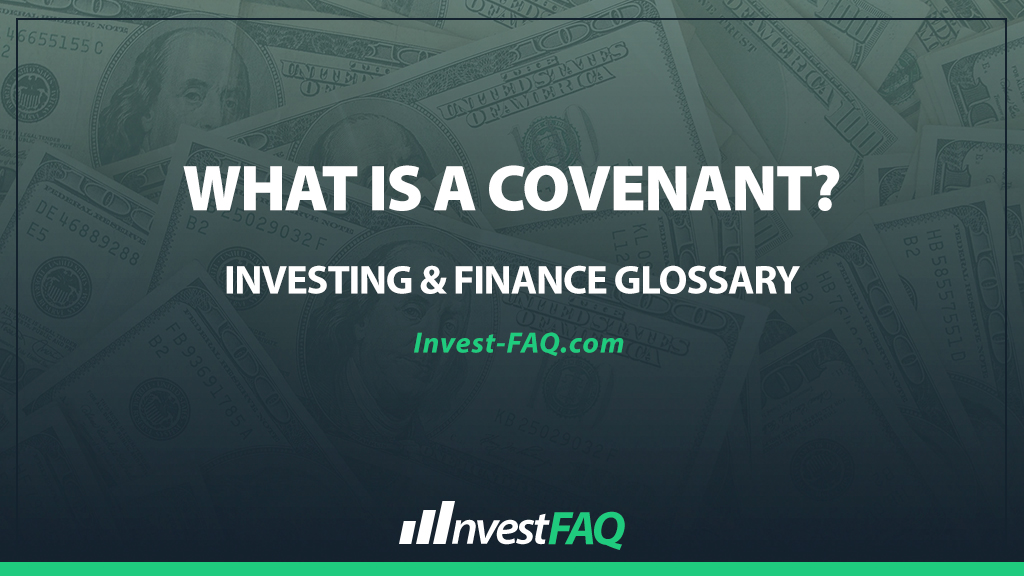
Covenant
Contents
A covenant in a business context refers to a formal agreement or promise within a contract that stipulates certain conditions, actions, or restrictions that the involved parties must adhere to. In finance and real estate, covenants are often used to protect the interests of lenders or property owners by ensuring certain standards are maintained or specific actions are undertaken.
Covenants play a crucial role in business transactions, especially in lending agreements and leasing contracts. They are designed to reduce the risk for lenders and investors by ensuring that borrowers or lessees operate within agreed-upon parameters.
These agreements can include positive covenants, which require the party to perform specific actions, and negative covenants, which restrict the party from certain activities. Covenants ensure that businesses follow through with their obligations, thereby protecting the financial stability of both parties involved.
Example of a Covenant
Consider “XYZ Corporation” that has obtained a loan from “ABC Bank.” As part of the loan agreement, ABC Bank includes a covenant requiring XYZ Corporation to maintain a minimum interest coverage ratio of 2.0 throughout the loan’s term. This means that XYZ Corporation must generate enough earnings before interest and taxes (EBIT) to cover its interest expenses by at least twice.
In this scenario, the covenant acts as a safeguard for ABC Bank by ensuring that XYZ Corporation remains financially healthy enough to service its debt. If XYZ Corporation’s interest coverage ratio falls below the specified threshold, it could trigger a breach of covenant, allowing ABC Bank to take corrective actions, which might include demanding immediate repayment of the loan or renegotiating the loan terms.
This covenant helps ABC Bank manage its credit risk while providing XYZ Corporation with a clear financial benchmark to maintain.
Types and Uses in Business Scenarios
Covenants are utilized across various business scenarios, including:
Loan Agreements: To ensure borrowers maintain certain financial ratios, restrict additional borrowing, or limit dividend payments.
Lease Agreements: Requiring lessees to maintain the property in good condition or restrict certain types of activities on the premises.
Mergers and Acquisitions: Stipulating certain operational practices that the acquiring or merging entities must follow post-transaction.
Partnership Agreements: Setting out the roles, responsibilities, and financial contributions of each partner.
Significance for Investing & Finance
From an accounting perspective, covenants are significant due to their impact on financial reporting and risk management:
Financial Planning: Covenants require companies to monitor and manage their financial performance closely, affecting how resources are allocated and operations are conducted.
Compliance: Adhering to covenants is essential for legal and financial compliance, affecting the company’s relationship with lenders and investors.
Risk Management: Covenants serve as a mechanism for identifying and mitigating financial risks by ensuring that companies do not engage in overly risky activities that could jeopardize their ability to meet financial obligations.
In summary, a covenant is a pivotal element in many business contracts, serving to protect the interests of involved parties by stipulating specific conditions for behavior and performance.
They are integral to financial agreements, playing a key role in shaping corporate behavior, ensuring compliance, and managing risk.
FAQ
How do covenants in loan agreements protect the lender?
Covenants in loan agreements protect the lender by imposing financial and operational constraints on the borrower, ensuring the borrower maintains a certain level of financial health and stability, thereby reducing the risk of default.
Can a breach of covenant have legal consequences for businesses?
Yes, a breach of covenant can have legal consequences, including the lender calling for immediate repayment of the loan, altering the terms of the loan, or taking legal action to enforce compliance, which can impact a business’s financial stability and operations.
What is the difference between an affirmative covenant and a negative covenant in business contracts?
An affirmative covenant requires the borrower to take specific actions (such as maintaining insurance or providing regular financial statements), while a negative covenant restricts the borrower from certain activities (like incurring additional debt or selling key assets), both serving to protect the lender’s interests.
How do covenants in real estate transactions ensure the property’s value is maintained?
Covenants in real estate transactions can dictate certain conditions on the use, appearance, and maintenance of a property, ensuring that it remains valuable and desirable by preventing actions that could negatively affect its condition or the surrounding area’s aesthetic.
